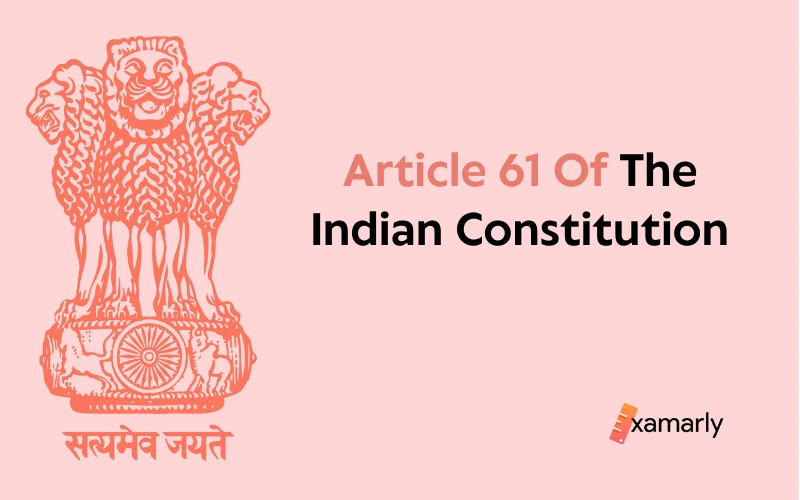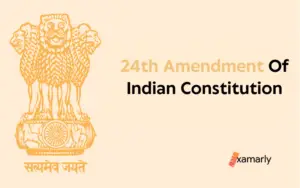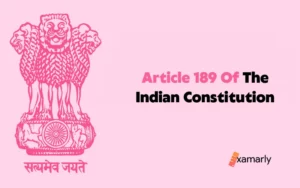Having a thorough understanding of Article 61 of the Indian Constitution is important for all citizens. The article outlines the procedure for impeachment of the President of India and provides a legal basis for the same. The article also provides the definition of impeachment, which means removing the President from office by court order for misconduct in office.
Read this article to figure out what article 61 is all about. The impeachment of the president is explained in this article, which is crucial for UPSC Indian Polity Preparation.
What Is The Article 61 Of The Indian Constitution?
A constitutional remedy for major offenses against the system of government is the impeachment of the president. An impeachment is an important event that happens when the president of an Indian country violates a constitutional provision or neglects to carry out any essential duties for the growth of the country. Article 61 of the Indian Constitution specifically addresses the process for impeaching the Indian President. It’s the first stage of a remedial procedure that could also result in expulsion from public office and potential future office ineligibility.
Meaning Of Impeachment
Impeachment is the process of putting into question the reliability or legitimacy of something. The process of removing someone from a position from all of the duties and responsibilities required by the job is referred to as impeachment. Impeachment is the name given to the entire process of removing a public official from office. Generally, it alludes to the President, judicial judges, and other constitutional officers. In a nation with a federal presidential Constitutional republic government, impeachment refers to an accusation of wrongdoing made against a public officer.
Grounds For Impeachment
Only charges brought against the President of India by either house of Parliament that allege a violation of the Indian Constitution would result in his removal from office.
A special majority of each house may also impeach the President. When the investigations come to a stop, he or she is dismissed from office.
Procedure For Impeachment Of The President
- Either House of Parliament may bring an impeachment motion against the President for violating the Constitution.
- No such allegation may be proposed until
- (a) the proposition to prefer such an allegation is embodied in a resolution that has been presented after at least fourteen days’ written notice in which not less than one-fourth of the members of the House as a whole have indicated their intention to move the resolution has been made, and
- (b) the resolution has been approved by at least a two-thirds majority of the House’s members.
- When one of the Houses of Parliament has so preferred a charge, the other House shall examine the charge or cause the accusation to be examined, and the President shall have the right to appear and be represented at such investigation.
- If, as a result of the inquiry, a resolution proclaiming that the charge brought against the President has been upheld is passed by at least a two-thirds majority of the entire membership of the House by which the charge was examined or caused to be investigated, then the President will be removed from office as of the day on which the resolution is so passed.
How is the president elected?
There is no direct election for electing the President. He is elected by an electoral college. The electoral college consists of only elected members:
- Lok Sabha and Rajya Sabha
- Only legislative assemblies of the states and not legislative councils
- Legislative assemblies of the Union Territories
For Further Readings: Different Articles On President of India
Conclusion
Impeachment is used to protect the constitutional government, not to punish specific people.
The procedure of impeachment is quasi-judicial, meaning that a special majority of two-thirds of members present and voting in both the House of Parliament is required. Prior to this, the opposition party must first initiate an investigation.
FAQs On Article 61
Does Any Indian President Got Impeached?
No Indian President has ever been removed from office.
What Does Article 61 Of The Indian Constitution Deal With?
The impeachment of the president is covered in Article 61. Through impeachment, the president may be removed from office before the end of his or her term.
Who Can Initiate An Impeachment Proceeding Against The President Of India?
Either house of the Parliament has the authority to begin the impeachment process against the President.
What Is Article 62 Of The Indian Constitution?
It is necessary to complete the election before the real term expires in order to fill a vacancy caused by the conclusion of the President’s term of office. In Article 62, this is mentioned.
What Happens When A Vacancy Occurs Due To The Impeachment Of The President?
When there is a vacancy in the position of President of Parliament, the Vice-President serves in that capacity until a new President is chosen. All of the President’s benefits and compensation will be available to the Vice President. The Chief Justice of India acts as President when both the Vice President and President positions are vacant.






